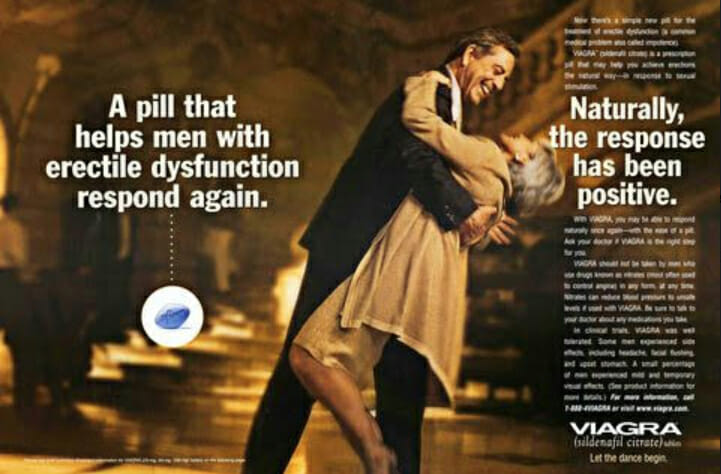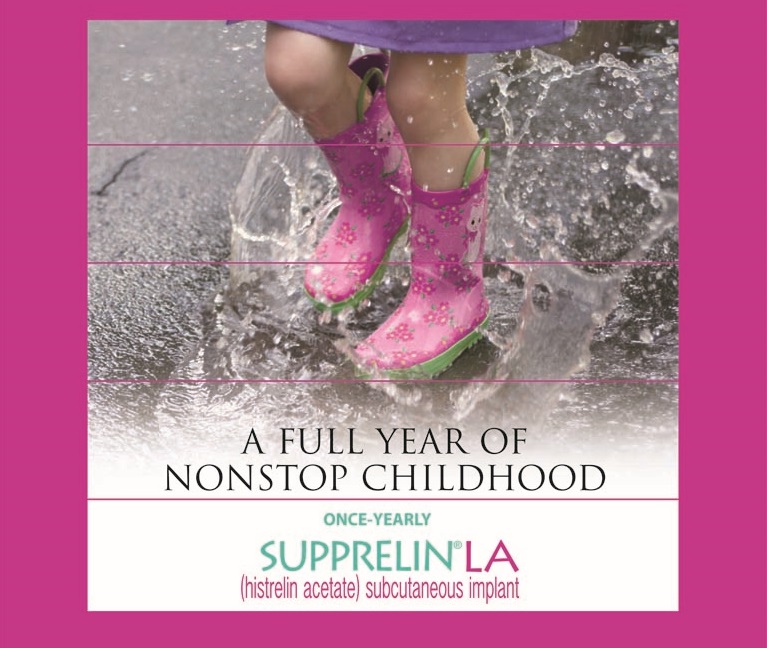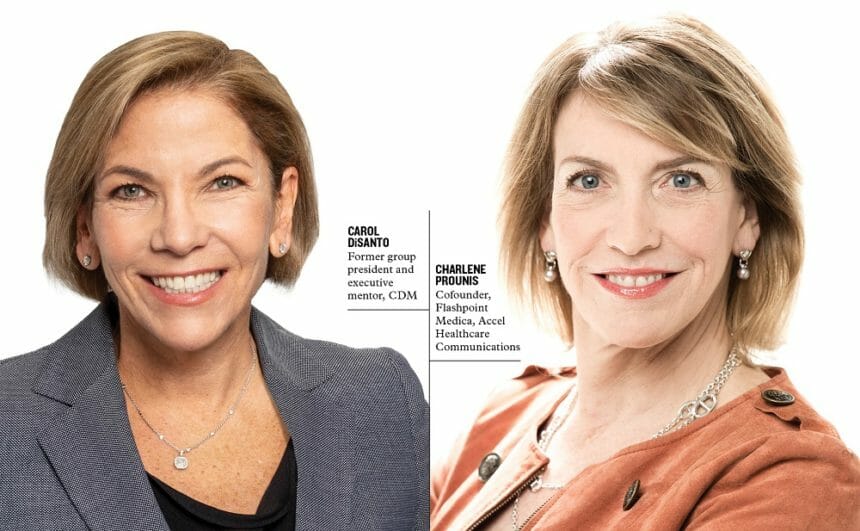When the Medical Advertising Hall of Fame’s powers that be assemble in the fall to choose the following year’s inductees, there’s traditionally some tension in the process. Over the course of the institution’s two-decade history, it has attempted to honor in equal measure the industry’s best-known leaders — the ones with their names on the door, so to speak — and the ones whose legacies transcend the organizations with which they partnered and the brands upon which they toiled.
With its incoming 2019 class of lifelong CDM star Carol DiSanto and agency entrepreneur par excellence Charlene Prounis, the MAHF gets to have it both ways. During their lengthy careers, both DiSanto and Prounis were well-respected by their peers for their work on everything from Viagra (DiSanto played a pivotal account role) to Rituxan (Prounis’ relationship with Genentech was so strong she still bunks at the houses of former company execs during West Coast trips). At the same time, their legacies loom large, given the interest both took in mentoring the next generation of agency leaders.
“I loved everything about advertising — the creativity, the big thinking, and the diversity in the kinds of people you worked with,” Prounis says. “And I absolutely thrived on all of that. But when you ask what I’d like to be known for, it’s helping other women’s careers.”
“My career was all about zigging and zagging. I had an account role, a production role, a client services role — it was always like, ‘Tag, you’re it,’” DiSanto explains. “I always found myself going back to what the original CDM partners — Clyde [Davis], Morgan [Cline], and Fred [Mann] — taught me, which was to believe in people. If you find good people who have a brain and a heart, and then challenge them, they’re going to do great and the company’s going to do great.”
Here’s a look at two professional lives well spent.
CDM, or Carol DiSanto and men
DiSanto’s career at CDM spanned the agency’s growth from a 25-person upstart to a 2,500-person behemoth. “The joke was always that CDM stood for ‘Carol DiSanto and men,’” she recalls with a laugh. Yet as she looks back on it from the comfort of semi-retirement — as she eased out of her role at CDM, she completed her Bell Leadership Institute certification, which she uses to counsel leaders on a one-to-one and group basis — DiSanto seems both humbled and awed by the arc of her career.
“When I got the call about [the MAHF induction], I was a little taken aback and surprised,” she explains. “Not that I lack confidence, but I had that reaction to a lot of the major things that happened in my career. ‘Really? Me? President of the group? Cool.’”
Prior to arriving at Cline Davis & Mann in 1987, DiSanto worked in account roles for two consumer-minded ad firms. It was that experience that caught the attention of the CDM partners: The agency was preparing to launch OTC diarrhea and constipation drug Equalactin for Pfizer and needed to bulk up its consumer muscle. “I saw the creative, which was great, and said, ‘I want in on this,’”DiSanto recalls. The product tanked upon release, but DiSanto impressed colleagues with both her intelligence and empathy.
Carol DiSanto, formerly CDM
“My career was all about zigging and zagging. I had an account role, a production role, a client services role — it was always like, ‘Tag, you’re it.’”
“She had a magical way about her,” says Omnicom Health Group CEO Ed Wise, who worked alongside her on CDM’s famously well-received Bob Dole Viagra ad and much more over the years. “The thing that made her extraordinary was she was what I’d call a client whisperer. In situations where there was a great amount of frustration, she was always able to come in and calm things down. She had the competence and the sincerity to look people in the eye and say, ‘We’re going to fix this,’ and deliver on that time and again.”
That competence begat a great deal of confidence in DiSanto’s ability to handle just about any task.When a need emerged for content to air on Lifetime Medical Television, DiSanto moved into a production role. When the Viagra assignment arrived, she was shifted back into account work. When concern brewed up over possible client tweaks to creative for Novartis’ Zelnorm, DiSanto was the one tasked with telling the client, as she remembers it, that “they were creating a Franken-ad.” She eventually talked the client into seeing things CDM’s way. If anything truly flustered her, nobody noticed.

At the same time, DiSanto was acutely conscious that CDM was growing exponentially. “We were starting to think of big titles such as EVP and managing partner, and I realized I wasn’t going to get there while working in California coordinating these TV shoots in my jeans and cowboy boots,” she recalls. “It was incredibly fun, but I came back and found my fun somewhere else.”
Not long thereafter, in 1997, Omnicom acquired CDM. DiSanto’s natural skill as a leader made her an obvious candidate for the larger jobs that opened up in the wake of the deal —and her ability to finesse challenging situations made her an invaluable asset at a time of great change.
“It was definitely a turning point. It used to be that we’d figure everything out one way or another, but now we had an outside influence there to support us,” she says. “We went from proudly insular to, ‘OK, now you can play and collaborate with all these other [Omnicom] companies.’ It was competitive in a good way.”
Before long, DiSanto was CDM Group’s president, with nine companies, including SSCG Media and a production hub, under her purview. What she calls “CDM’s own little mini-holding group” may well have been the forerunner to today’s Omnicom HealthGroup.
When DiSanto announced her plan to depart the agency in mid-2015, people inside and outside the agency were, to put it mildly, stunned. “I got a lot of, ‘No, come on, what really happened?’” she says with a laugh. But the decision to leave was grounded in the same deliberateness that characterized any number of DiSanto’s professional decisions.
“Why can’t people manage the back end of their careers the way they manage the front end? Why can’t somebody leave gracefully?” she asks. “I’d seen so many people either burn out, stroke out, or get kicked out. I wanted to find a way to publicly and authentically move over to something else. There is life after an intense career.”
DiSanto spent the past two years of her CDM life overseeing Omnicom’s Pfizer consolidation. Wise remains impressed by how she managed her departure, especially given the scope of her responsibilities at the time. “She was brave enough to say, ‘Let’s figure this out together. This is what I want to do, so let’s make it work.’ There was no emotional nonsense or false pride there,” he notes.
DiSanto remains busy in not-retirement, sitting on the local community board and continuing her work as a Bell Leadership Institute disciple. When asked for her opinion about what she likes and doesn’t like in today’s pharma and healthcare marketing, initially she defers: “I’ll leave that one to the professionals.” However, later she adds via email, “It’s genuinely out of respect for those who are fully committed to the industry on a day-to-day basis. Only when you’re in it, and know what’s happening on the client and agency side up, down, and around, do you have the right to offer an opinion. Otherwise, it’s just speculation and judgment, and I’m not comfortable with either.”
DiSanto’s sensitivity to answering a question — one that has been known to set off other MAHF inductees on a “when I was your age” tangent — speaks volumes about her as both a person and a pro’s pro. “You know the core values we’ve developed over the years? It’s substance, style, conviction, and grace,” Wise says. “Well, the ‘grace’ was Carol. Always.”
‘Her people have always worshiped her’
No list of modern-era agency entrepreneurs would be complete without Charlene Prounis somewhere near the top. The cofounder of Accel Healthcare Communications and Flashpoint Medica — in both cases with longtime friend and peer Risa Bernstein, now a senior executive at FCB Health — Prounis is the rare individual to have succeeded twice at a task that has humbled many self-styled alpha leaders.
Two years after she exited Flashpoint Medica, Prounis remains very much in the agency game via her role on W2O’s board. Indeed, it’s a sign of her continuing influence that her name is consistently one of the first mentioned anytime a leadership void opens up.
Not that Prounis has any desire to re-enter that world full time. “I’m still meeting people for coffee and drinks — people who I worked with, people who were referred to me — and those are great conversations,” she says. “A couple times I’ve heard, ‘If you come back or if you start another agency,’ but I wouldn’t have sold my company if I wanted to keep working.” She pauses, then adds with a laugh, “It is lovely to know there are still some people out there who want to work with me.”
Told of this comment, Tom Harrison, former chairman and CEO of Omnicom’s Diversified Agency Services division and a guy who, as one of the founders of Harrison & Star, knows a little about the agency biz, laughs loudly. “Her people have always worshiped her,” he says. “That’s always been her leadership style: She comes up with these bigger-than-usual ideas and magnetizes the people around her. I don’t know how many other [agency leaders] you can say that about.”

As Prounis puts it,advertising was her “third and final career.” She started her professional life as a medical intensive care and cardiac care unit nurse at North Shore University Hospital.
Wanting more autonomy but not keen on the idea of becoming a doctor, Prounis shifted to the world of pharma as a sales rep for Searle. While she enjoyed the job and says life as a rep “really does toughen you up, in a good way,” Prounis set her sights elsewhere after nearly half a decade.
“I’m a little restless,” she says. “My career has always been about striving to be better and better.”
She landed at Grey Healthcare Group (then Gross Townsend Frank Hoffman), working her way up from account executive to SVP over the course of a dozen years. During that time, she became one of the company’s go-to people for all things Merck, leading the launches of Mevacor and Pepcid, among other successful brands.
Yet the restlessness kicked in once again, even after she was offered a coveted president role. “There I was, at the top of my career. I knew everybody, had a lot of relationships, was in charge of business development — but the second Risa floated the idea of starting an agency, I was in, just like that,” Prounis recalls.
Along with two other partners, the pair cofounded Accel in 1999 as a startup within Omnicom. Within five years, fueled by partnerships with Genentech (Rituxan), GlaxoSmithKline (Coreg), and Wyeth (Protonix), the agency passed the $20 million revenue milestone. Prounis and Bernstein sold the agency to Corbett (it became Corbett Accel), but decided to depart shortly thereafter. “It just didn’t feel right,” Prounis explains.
Charlene Prounis, board member, W2O
“When you can look up and see someone who looks like you, that’s what it’s all about.”
Weeks later, Prounis and Bernstein found themselves pitching Omnicom on another startup agency, which would soon be known as Flashpoint Medica. As opposed to Accel — which had a med-ed arm — Flashpoint was an advertising-only play, which made the relationships Prounis nurtured during her time at Accel and Gross Townsend Frank Hoffman incredibly important during the agency’s formative years.
“One of the things that made us more successful the second time around was directly attributable to Charlene. It was those tremendous relationships she had with her clients,” Bernstein recalls. “Genentech took a chance on us with some Herceptin business that put us on the map.”
Flashpoint’s growth lapped Accel’s, with the agency passing the $25 million revenue mark (“and I think I could’ve gotten to $30 million or $50 million if I’d stayed around,” Prounis says).
Non-work-related issues prompted her second exit from a firm at the pinnacle of its success. “I had a milestone birthday and then two of my close friends had significant health issues,” Prounis explains. “I wanted to be able to enjoy the other side of life, so to speak.”
That other side has included a continuation of her mentorship work with industry women, in large part through her longstanding leadership of the Healthcare Businesswomen’s Association. She twice served as the organization’s president, in 1999 and 2004, and is credited by any number of execs as one of the industry’s true champions of women leaders.
“Charlene has an incredibly big heart and is dedicated to giving forward and building the next generation of communicators,” Harrison says. That, Prounis hopes, will be her professional legacy. “I love giving back. I’ve loved my work with the HBA, MAHF, and as a Girl Scout leader,” she notes. And it goes without saying she’s enormously proud of her status as one half of the MAHF’s first all-women class of inductees.
“This year, two women will become role models for other women,” Prounis continues. “When you can look up and see someone who looks like you, that’s what it’s all about.”
From the February 01, 2019 Issue of MM+M - Medical Marketing and Media








